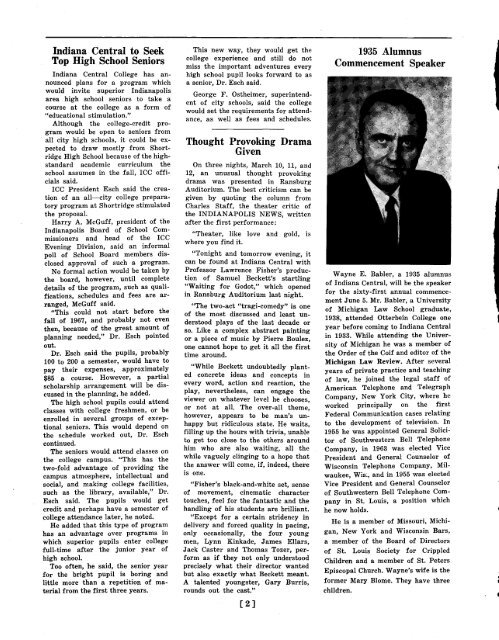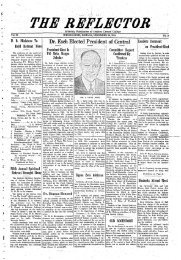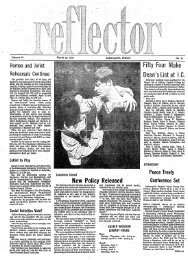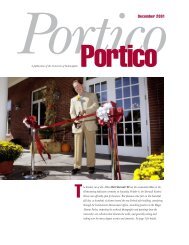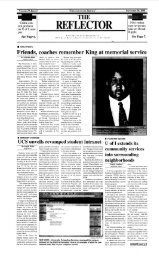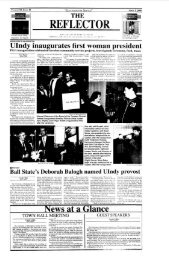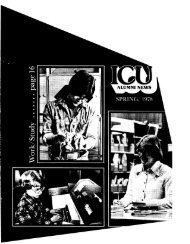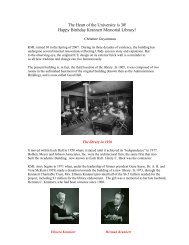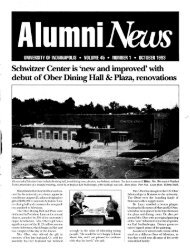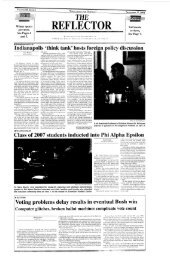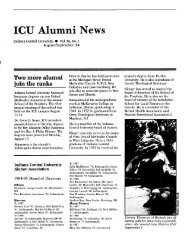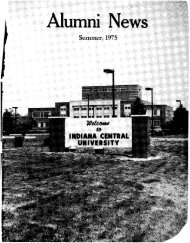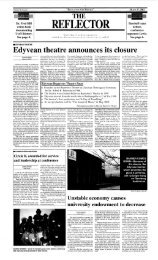ALUMNI NEWS - Frederick D. Hill Archives
ALUMNI NEWS - Frederick D. Hill Archives
ALUMNI NEWS - Frederick D. Hill Archives
Create successful ePaper yourself
Turn your PDF publications into a flip-book with our unique Google optimized e-Paper software.
Indiana Central to Seek<br />
Top High School Seniors<br />
Indiana Central College has an-<br />
nounced plans for a program which<br />
would invite superior Indianapolis<br />
area high school seniors to take a<br />
course at the college as a form of<br />
“educational stimulation.”<br />
Although the college-credit pro-<br />
gram would be open to seniors from<br />
all city high schools, it could be ex-<br />
pected to draw mostly from Short-<br />
ridge High School because of the high-<br />
standard academic curriculum the<br />
school assumes in the fall, ICC offi-<br />
cials said.<br />
ICC President Esch said the crea-<br />
tion of an all-city college prepara-<br />
tory program at Shortridge stimulated<br />
the proposal.<br />
Harry A. McGuff, president of the<br />
Indianapolis Board of School Com-<br />
missioners and head of the ICC<br />
Evening Division, said an informal<br />
poll of School Board members dis-<br />
closed approval of such a program.<br />
No formal action would be taken by<br />
the board, however, until complete<br />
details of the program, such as quali-<br />
fications, schedules and fees are ar-<br />
ranged, McGuff said.<br />
“This could not start before the<br />
fall of 1967, and probably not even<br />
then, because of the great amount of<br />
planning needed,” Dr. Esch pointed<br />
out.<br />
Dr. Esch said the pupils, probably<br />
100 to 200 a semester, would have to<br />
pay their expenses, approximately<br />
$85 a course. However, a partial<br />
scholarship arrangement will be dis-<br />
cussed in the planning, he added.<br />
The high school pupils could attend<br />
classes with college freshmen, or be<br />
enrolled in several groups of excep-<br />
tional seniors. This would depend on<br />
the schedule worked out, Dr. Esch<br />
continued.<br />
The seniors would attend classes on<br />
the college campus. “This has the<br />
two-fold advantage of providing the<br />
campus atmosphere, intellectual and<br />
social, and making college facilities,<br />
such as the library, available,” Dr.<br />
Esch said. The pupils would get<br />
credit and perhaps have a semester of<br />
college attendance later, he noted.<br />
He added that this type of program<br />
has an advantage over programs in<br />
which superior pupils enter college<br />
full-time after the junior year of<br />
high school.<br />
Too often, he said, the senior year<br />
for the bright pupil is boring and<br />
little more than a repetition of ma-<br />
terial from the first three years.<br />
This new way, they would get the<br />
college experience and still do not<br />
miss the important adventures every<br />
high school pupil looks forward to as<br />
a senior, Dr. Esch said.<br />
George F. Ostheimer, superintend-<br />
ent of city schools, said the college<br />
would set the requirements for attend-<br />
ance, as well as fees and schedules.<br />
Thought Provoking Drama<br />
Given<br />
On three nights, March 10, 11, and<br />
12, an unusual thought provokihg<br />
drama was presented in Ransburg<br />
Auditorium. The best criticism can be<br />
given by quoting the column from<br />
Charles Staff, the theater critic of<br />
the INDIANAPOLIS <strong>NEWS</strong>, written<br />
after the first performance:<br />
“Theater, like love and gold, is<br />
where you find it.<br />
“Tonight and tomorrow evening, it<br />
can be found at Indiana Central with<br />
Professor Lawrence Fisher’s produc-<br />
tion of Samuel Beckett’s startling<br />
“Waiting for Godot,” which opened<br />
in Ransburg Auditorium last night.<br />
“The two-act “tragi-comedy” is one<br />
of the most discussed and least un-<br />
derstood plays of the last decade or<br />
so. Like a complex abstract painting<br />
or a piece of music by Pierre Boulez,<br />
one cannot hope to get it all the first<br />
time around.<br />
“While Beckett undoubtedly plant-<br />
ed concrete ideas and concepts in<br />
every word, action and reaction, the<br />
play, nevertheless, can engage the<br />
viewer on whatever level he chooses,<br />
or not at all. The over-all theme,<br />
however, appears to be man’s un-<br />
happy but ridiculous state. He waits,<br />
filling up the hours with trivia, unable<br />
to get too close to the others around<br />
him who are also waiting, all the<br />
while vaguely clinging to a hope that<br />
the answer will come, if, indeed, there<br />
is one.<br />
“Fisher’s black-and-white set, sense<br />
of movement, cinematic character<br />
touches, feel for the fantastic and the<br />
handling of his students are brilliant.<br />
“Except for a certain stridency in<br />
delivery and forced quality in pacing,<br />
only occasionally, the four young<br />
men, Lynn Kinkade, James Ellars,<br />
Jack Caster and Thomas Tozer, per-<br />
form as if they not only understood<br />
precisely what their director wanted<br />
but also exactly what Beckett meant.<br />
A talented youngster, Gary Burris,<br />
rounds out the cast.’’<br />
1935 Alumnus<br />
Commencement Speaker<br />
Wayne E. Babler, a 1935 alumnus<br />
of Indiana Central, will be the speaker<br />
for the sixty-first annual commence-<br />
ment June 5. Mr. Babler, a University<br />
of Michigan Law School graduate,<br />
1938, attended Otterbein College one<br />
year before coming to Indiana Central<br />
in 1933. While attending the Univer-<br />
sity of Michigan he was a member of<br />
the Order of the Coif and editor of the<br />
Michigan Law Review. After several<br />
years of private practice and teaching<br />
of law, he joined the legal staff of<br />
American Telephone and Telegraph<br />
Company, New York City, where he<br />
worked principally on the first<br />
Federal Communication cases relating<br />
to the development of television. In<br />
1955 he was appointed General Solici-<br />
tor of Southwestern Bell Telephone<br />
Company, in 1963 was elected Vice<br />
President and General Counselor of<br />
Wisconsin Telephone Company, Mil-<br />
waukee, Wis., and in 1955 was elected<br />
Vice President and General Counselor<br />
of Southwestern Bell Telephone Com-<br />
pany in St. Louis, a position which<br />
he now holds.<br />
He is a member of Missouri, Michi-<br />
gan, New York and Wisconsin Bars,<br />
a member of the Board of Directors<br />
of St. Louis Society for Crippled<br />
Children and a member of St. Peters<br />
Episcopal Church. Wayne’s wife is the<br />
former Mary Blome. They have three<br />
children.


